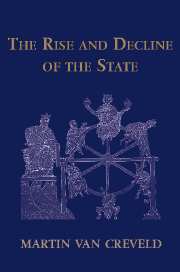Book contents
6 - The decline of the state: 1975–
Published online by Cambridge University Press: 26 June 2009
Summary
As we saw, the man who really “invented” the state was Thomas Hobbes. From his time up to the present, one of its most important functions – as of all previous forms of political organization – had been to wage war against others of its kind. Had it not been for the need to wage war, then almost certainly the centralization of power in the hands of the great monarchs would have been much harder to bring about. Had it not been for the need to wage war, then the development of bureaucracy, taxation, even welfare services such as education, health, etc. would probably have been much slower. As the record shows, in one way or another all of them were originally bound up with the desire to make people more willing to fight on behalf of their respective states.
To focus on the field of economics alone, the Bank of England as the first institution of its kind originated in the wars which Britain fought against Louis XIV. Early in the nineteenth century the first modern income taxes were likewise the product of war, as were both legal tender and its most important specimen, the greenback.
- Type
- Chapter
- Information
- The Rise and Decline of the State , pp. 336 - 414Publisher: Cambridge University PressPrint publication year: 1999
- 2
- Cited by



